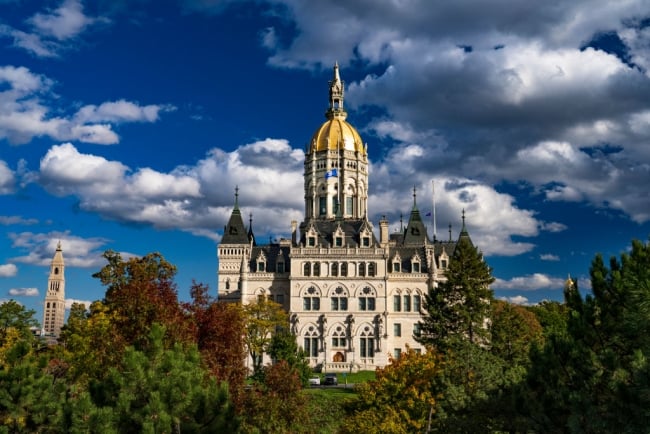You have /5 articles left.
Sign up for a free account or log in.

The Connecticut state capitol in Hartford, where lawmakers passed a bill requiring colleges to report their legacy admit data.
Visions of America/Joseph Sohm/Universal Images Group via Getty Images
Connecticut lawmakers will not move ahead with a proposed ban on legacy admissions preferences that advanced from committee in March. Instead, the state Senate passed a bill that would require colleges to report data on legacy admissions to the legislature. The House will vote on that measure in the next week.
The bill’s amendment follows a months-long fight between lawmakers and private colleges that oppose state intervention, including Yale and Fairfield Universities, where recent classes have been made up of nearly 15 percent legacy admits.
Connecticut would have been the second state to prohibit preferences for relatives of alumni at both public and private institutions; Maryland became the first last week, though its most selective private institution, Johns Hopkins University, ended the practice in 2020. Two other states, Colorado and Virginia, ban legacy preferences at public but not private institutions.
The bill was one of many legislative attacks on alumni preferences to emerge after last June’s Supreme Court ruling banning affirmative action, which unleashed a wave of public sentiment against the practice.
Connecticut state senator Derek Slap, who co-sponsored the legacy ban bill, told Inside Higher Ed in March that although he was hopeful that the time had come for such a law, he knew there was a possibility it would be negotiated down to a transparency measure, even after it passed the education committee 18 to 4.
It’s a fate familiar to legacy abolitionists across the country. After the Varsity Blues scandal caused an outcry in college admissions in 2019, a California bill to ban legacy preferences seemed to have unstoppable momentum. But after the bill languished in committee for a year, state lawmakers transformed it into a transparency bill instead, which they passed in 2020.
Bills to ban legacy at public and private colleges are still up for consideration in many other states, including New York and Massachusetts.









